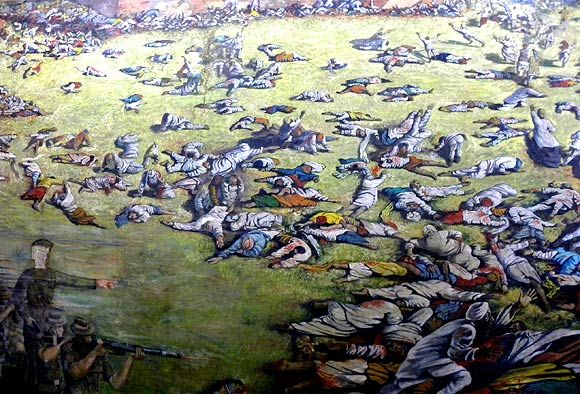'Till we are able to understand this reality of what is happening to our fellow citizens today in 2018, it would be hypocrisy to continue to teach in our textbooks about the great atrocity of 1919,' argues Aakar Patel.

IMAGE: A mural of the Jallianwalla Bagh massacre. Photograph: Vaihayasi Pande Daniel/Rediff.com
Ninety nine years ago, in April 1919, the massacre of Jallianwala Bagh happened.
We are all taught in school of the details. An officer named Colonel Dyer (later brigadier general) ordered 90 soldiers, 65 Gurkhas and 25 Punjabis from the Baloch regiment to open fire on a crowd in Amritsar.
The soldiers fired with their Lee Enfield .303 rifles, stopping to reload every few seconds.
In about 10 minutes, the Indian soldiers fired over 1600 bullets into the unarmed crowd.
The government said the crowd had gathered there in violation of orders, and the official number said that 379 people were killed and over 1,100 wounded.
The Congress said that more than 1,000 people were killed, and we will never know the exact number.
I find it hard to believe that the official number was wrong, for several reasons. Anyway, the story shocked the world and Rabindranath Tagore gave up his knighthood.
Many of us will know that the crowd was protesting against the Rowlatt Act. What was so problematic about it?
The Rowlatt Act said that any Indian could be detained without trial.
This was preventive detention, meaning that the government would hold any citizen in jail without any crime having been committed.
Essentially, it means that if someone inside the government suspects that a citizen might commit a crime later, that citizen can be put in jail.
Indians were outraged by such a law and one Lahore newspaper described the Rowlatt Act with the headline: 'No dalil, no vakil, no appeal'. That is a good description of what preventive detention is.
This then is the background to the Jallianwala Bagh event and this is the nature of the law for which so many of our fellow citizens were protesting and were killed.
They felt the colonial government was wrong to jail Indians without charge or trial and it is difficult to see why they were wrong in protesting.
Because of Jallianwala Bagh, the Rowlatt Act's provisions were not fully implemented.
That was 99 years ago, under a colonial government. Let us turn to the present.
In November 2017, the Uttar Pradesh government jailed the Dalit leader Chandrashekhar Azad Ravan without a case. He was booked under the National Security Act.
Under the NSA, Chandrashekhar Azad does not have any of the human rights protections that are part of ordinary criminal procedure and fair trial standards.
He can be jailed for 12 months without charge or trial.
On his release, if he is released, he can be put back again under some other detention law.
Chandrashekhar Azad's term of administrative detention expired a few days ago on May 2.
On that day, a non-judicial 'advisory board' established under the NSA, put him in jail for another six months.
Instead of promising to have lunch with Dalits, it would be better if our leaders promised to treat them fairly and not use laws against them that are a basic violation of Constitutional rights.
The high court has also refused to release Chandrashekhar Azad.
Remember that he has not been charged with any crime.
This is preventive detention and in the past the Supreme Court has itself called the preventive detention laws 'lawless laws'.
There are many laws like the NSA under which the Government of India and our various states detain Indians that they may not personally like or disagree with.
We are doing to our people what even the colonial government hesitated to do. There is no problem getting Indian judges and bureaucrats to do this to their fellow Indians.
The reason I mentioned the detail of the shooting of 1919 was to reiterate that it was fellow Indians, Gurkhas and Punjabis, who actually took aim and pulled the triggers that killed so many of us in that peaceful protest.
The National Security Act sounds like a serious piece of legislation intended to save India from a security threat, but the government is not holding Chadrashekhar Azad for fear of any terrorism.
Indeed, most of our preventive detention laws have nothing to do with terrorism.
Gujarat can jail its citizens under the Gujarat Prevention of Anti-Social Activities Act.
Karnataka has the Prevention of Dangerous Activities Act (popularly known as the 'Goondas Act').
Periods of possible detention under state laws range from six months to two years.
Authorities can impose preventive detention for a range of activities in different states, including boot-legging, land-grabbing and even video piracy.
Tamil Nadu had 1,268 such people in jail in 2016, of whom 62 were either graduates or post-graduates, and 21 were women, according to a report in The Hindu.
The National Crime Records Bureau for 2015 showed that Telangana had detailed 339 Indians, Karnataka 232, and Gujarat 219.
Tamil Nadu's law is called the Prevention of Dangerous Activities of Bootleggers, Drug offenders, Forest offenders, Goondas, Immoral Traffic Offenders, Slum grabbers and Video Pirates Act.
The vague and open nature of the wording is absolutely deliberate.
The democratic Government of India, just like the colonial government, sees citizens as a nuisance.
It does not trust the legal system and demands to have open-ended and draconian laws that can jail us without a crime being committed.
Till we are able to understand and appreciate this reality of what is happening to our fellow citizens today in 2018, it would be hypocrisy to continue to teach in our textbooks about the great atrocity of 1919.
Aakar Patel is Executive Director, Amnesty International India. The views expressed here are his own.
- You can read Aakar's earlier columns here.











 © 2025
© 2025